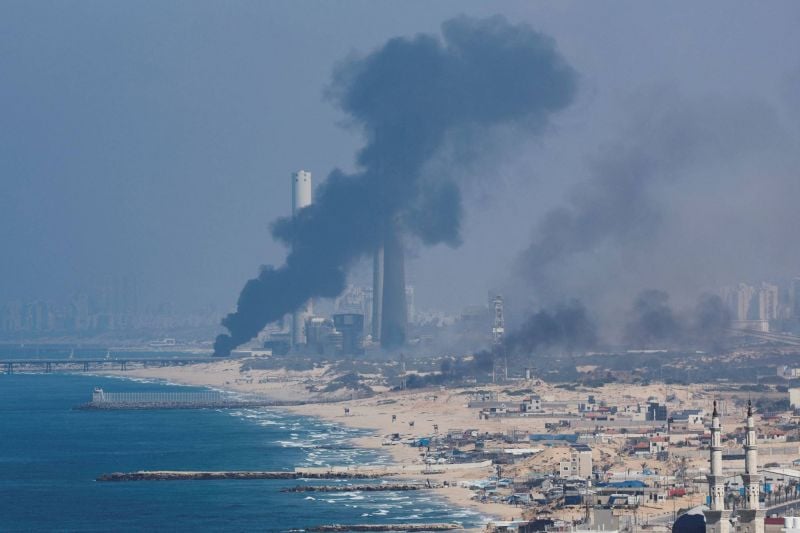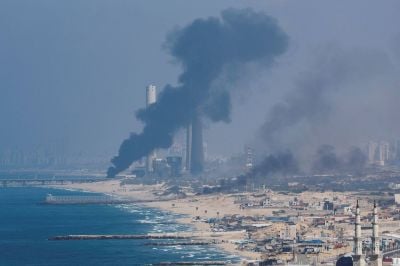
Smoke after Israeli raids on Gaza on Oct. 7, 2023 (Credit: Mohammed Salem/Reuters)
Click here to read our live coverage.
The parallel has been on countless minds since this morning: one day after the 50th anniversary of the October 1973 war, Hamas launched a massive surprise offensive against Israel.
Several aspects of the group’s so-called “Al-Aqsa Flood” attack make it distinct, if not unprecedented, compared to recent confrontations between Hamas and Israel.
Firstly, it highlights the vulnerabilities of Israeli intelligence, which appears to have been caught completely off guard, at least initially. This is the first time in decades that Israel has projected such a sense of vulnerability.
The second aspect, which amplifies this sentiment, is the information suggesting that dozens of Hamas fighters have infiltrated Israeli territory, taking civilians hostage. Images that circulated online this morning, including one of a Gazan journalist on the Israeli side and of civilians fleeing, will undoubtedly leave a lasting impression. The myth of an impregnable fortress has been seriously challenged.
The third aspect is that in just a few hours, initial reports indicate at least 20 deaths and several hundred injuries on the Israeli side.
While the comparison to 1973 might seem exaggerated for now, it's likely that this offensive will have implications that go beyond Gaza. It comes as the Hamas-Hezbollah-Tehran axis is strengthening and amid potential normalization between Israel and Saudi Arabia.
The attack was probably planned and coordinated over months with Hezbollah and Iran. Under the banner of "unity of fronts," Hamas and Hezbollah have significantly strengthened their ties over the past two years. Some of Hamas' leaders have found refuge in Lebanon, and the head of Hamas' political bureau, Ismail Haniyeh, also frequently visits Lebanon, particularly to meet with Hezbollah's Secretary-General, Hassan Nasrallah. Last April, several rockets were launched against Israel from Southern Lebanon in an attack attributed to Hamas.
Could Hezbollah participate in the current offensive? This is the major question for Lebanon amid this confrontation. As of Saturday afternoon, Hezbollah has only issued a statement of support. It's also worth noting that if Hezbollah truly wanted a surprise attack of their own, they would've launched one simultaneously with Hamas. Last year, Hezbollah endorsed the signing of an agreement demarcating the maritime border between Lebanon and Israel. It hasn't been in direct confrontation with Israel since 2006, and both the current Lebanese and regional situations are not in its favor. However, the mere fact that its potential involvement is being questioned changes some of the dynamics.
Consequences
In October 1973, Israel regained the upper hand and ultimately achieved a military victory. While a similar outcome is expected now, the initial images of Israeli vulnerability are likely to linger in people's minds, giving Hamas an opportunity to claim a "historic" victory.
This incident is expected to have repercussions on multiple levels. Firstly, it might further bolster Hamas at the expense of the Palestinian Authority. The Islamist movement aims to present itself as the only viable local representation for the Palestinians, positioning itself against a declining Fatah. Even if Hamas faces severe losses due to the Israeli response, its primary goal is different. The movement intends to exploit the current Palestinian and regional situations to "eliminate" Fatah from the equation. In this context, the recent events in Lebanon’s Ain al-Hilweh refugee camp, where factions close to Hamas have waged armed battles to oust Fatah, cannot be entirely overlooked.
During today’s attack, Israeli Prime Minister Benjamin Netanyahu vowed that Hamas would pay an "unprecedented price." However, the Israeli leader might find himself weakened by the failure of his country's intelligence and security apparatus. Leading a far-right coalition, Netanyahu will face immense pressure from the most radical factions within his government. How should they respond to such an assault? Can the Israeli military initiate a ground offensive against Gaza and reoccupy the territory they left in 2005? The Israeli response will have implications far beyond Gaza, affecting not only the continued colonization of the West Bank but also the normalization process.
A potential third consequence is regional in nature. How will Saudi Arabia react? Will this new conflict sink the normalization process? This is likely one of the attack's objectives and could explain its timing.
While it's too early to answer these questions definitively, it's already apparent that normalization is drifting further away. It will be challenging for Saudi Arabia to sign a peace agreement with Israel, especially since Israel would not make any concessions to the Palestinians. The primary message of the attack is clear: Tehran wants to signal to Riyadh that peace with Israel comes at a high cost.
